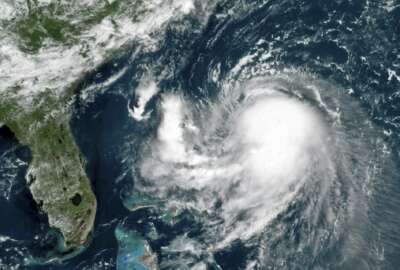

DHS Secretary Alexandro Mayorkas is setting up a new Climate Change Professionals Program to recruit graduates and current agency employees to support the...
From disaster recovery to critical infrastructure protection to immigration, every mission across the Department of Homeland Security is facing new and ever-growing challenges from the changing climate.
To that end, DHS Secretary Alejandro Mayorkas wants to make sure agency employees have the skillsets and knowledge to manage these real and potential threats.
Mayorkas is setting up a new Climate Change Professionals Program, which aims to recruit recent graduates and current agency employees to support the department’s growing focus on adapting to climate change and improving resilience. The training effort is one of many new activities under the DHS Climate Change Action Group that Mayorkas established last year.

“The Climate Change Professionals Program will be instrumental in helping the department adapt to our changing climate by providing hands-on experience and guidance to young professionals interested in climate adaptation and resilience,” Mayorkas said in a release. “This program will develop the next generation of climate experts, improve climate literacy throughout the department, and help us execute our Climate Action Plan to remain mission-resilient while reducing our own impacts on the environment.”
The two-year program will live under the Office of the Chief Readiness Support Officer (CRSO), Sustainability and Environmental Programs (SEP). DHS expects the training program to launch in June and include 10-12 participants.
Through the training effort, employees and participants in the Pathways internship program will receive “hands-on opportunities to contribute to new initiatives that have the potential to substantially help DHS adapt to climate change and improve resilience.”
Training program participants will work under the Climate Change Action Group, which includes senior officials from across DHS and focuses on promoting resilience and addressing multiple climate change-related risks, including flooding, extreme heat, drought and wildfires.
At the end of this training program, employees and interns will receive a Climate Change Professional accreditation from the Association of Climate Change Officers and be eligible for permanent, full-time positions at DHS.
To get a sense of the types of positions DHS is training and recruiting for, it released three job postings, looking for environmental protection specialists and management and program analysts. DHS is looking for current employees in the GS 7-9 range for the management and program analyst and GS-11-12 range for the environmental protection specialist roles.
The opportunities, however, are open to any current employees with an interest in working on climate issues, whether or not their current roles are focused on these areas.
Mayorkas said in April when he launched the Climate Change Action Group that the agency has to do more to address the climate crisis
The group will focus on six priorities focused on the DHS mission, including adapting operations, assets and resources to address climate change.
“The scale of the emergency is only growing and this body will refocus and elevate our efforts,” Mayorkas said at the launch of the group. “In the coming years, we will reorient FEMA so that it achieves its long-standing goal of building a culture of preparedness in the context of novel risks above all those produced by climate change.”
The action group will provide recommendations and ideas for how DHS can evolve to be better prepared for the challenges of climate change.
DHS’s new training course is another piece to a larger push across the government for federal employees and facilities to improve the climate resiliency.
In October, 23 agencies, including DHS, released new climate change strategies, part of their response to a January executive order from President Joe Biden. The order called on agencies to ensure they’re prepared for the ever-evolving impacts of climate change, from the risks severe weather might have on their facilities to the vulnerabilities such events might pose on federal employees and their ability to do their jobs.
One of DHS’s goals in its strategy is to enhance the climate literacy of its management workforce.
“DHS is committed to creating and growing a climate literate workforce that understands the principles of climate change, can assess scientifically credible information about climate, can communicate about climate change in a meaningful way, and is able to make informed decisions about climate change impacts on mission activities,” the strategy states. “DHS will aggressively pursue strategies to ensure a diverse applicant pool, to include applicants from underserved communities and provide clear and accessible science-informed data, tools, technical assistance and information to the communities it serves. In the long term, DHS may explore the creation of new hiring authorities and retention programs to recruit and retain climate change talent through both Departmental and congressional action.”
DHS says by having a climate literate workforce, it will mitigate risks as it develops and designs projects and initiatives.
“[T]hose responsible for writing and implementing policy and decision-making need to be educated in climate literacy to fully consider climate risks and adaptation and resilience strategies and how to successfully work towards these actions. Climate literacy will be iterative because climate impacts and technologies for responding to climate change continue to evolve,” the strategy stated.
Copyright © 2025 Federal News Network. All rights reserved. This website is not intended for users located within the European Economic Area.
Jason Miller is executive editor of Federal News Network and directs news coverage on the people, policy and programs of the federal government.
Follow @jmillerWFED



